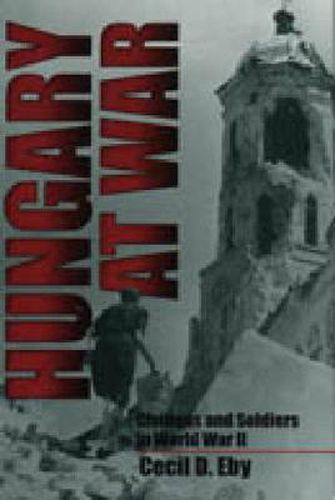Readings Newsletter
Become a Readings Member to make your shopping experience even easier.
Sign in or sign up for free!
You’re not far away from qualifying for FREE standard shipping within Australia
You’ve qualified for FREE standard shipping within Australia
The cart is loading…






Hungary’s place in World War II was been poorly documented because until recently any histories of the war years had to conform to Communist Party line. Originally allied with Germany to defend itself against Bolshevism, Hungary saw its army innihilated in 1943 and was subsequently invaded - and occupied - by the Soviets. Now fifty years after the closing of the Iron Curtain in 1948, the memories of those who endured those years can finally be shared. Cecil Eby has compiled an historical chronicle of Hungary’s wartime experiences based on interviews with nearly a hundred people who lived through those years. Here are officers and common soldiers, Jewish survivors of Auschwitz and Bergen-Belsen concentration camps, pilots of the Royal Hungarian Air Force, Hungarian prisoners of war in Russian labour camps, and a host of others. We meet the apologists for the Horthy regime installed by Hitler and the activists who sought to overthrow it, and we relive the Red Army’s siege of Budapest during the harsh winter of 1944-45 through the memories of people who were trapped there. Because of censorship and intimidation during the Communist epoch, most of the accounts shared here have never been told to anyone outside the subjects’ families. Often the most startling stories come from ordinary citizens. We learn of Ilona Joo, who survived in a cellar while German and Russian armies used her house and garden as a battleground, and of the remarkable Merenyi sisters, who trekked home to Budapest after being freed from Bergen-Belsen. Eby also includes a rare interview with a former member of the Arrow Cross, Hungary’s facist party, which sheds new light on its leadership. From these personal accounts, Eby draws readers into the larger themes of the tragedy of war and the consequences of individual actions in moments of crisis. Skilfully integrating oral testimony with historical exposition, Hungary at War reveals the knot of ideological, economic and ethnic attachments that entangled the lives of so many Hungarians. The result is an absorbing narrative that is a fitting testament to a nation buffeted by external forces beyond its capacity to control.
$9.00 standard shipping within Australia
FREE standard shipping within Australia for orders over $100.00
Express & International shipping calculated at checkout
Hungary’s place in World War II was been poorly documented because until recently any histories of the war years had to conform to Communist Party line. Originally allied with Germany to defend itself against Bolshevism, Hungary saw its army innihilated in 1943 and was subsequently invaded - and occupied - by the Soviets. Now fifty years after the closing of the Iron Curtain in 1948, the memories of those who endured those years can finally be shared. Cecil Eby has compiled an historical chronicle of Hungary’s wartime experiences based on interviews with nearly a hundred people who lived through those years. Here are officers and common soldiers, Jewish survivors of Auschwitz and Bergen-Belsen concentration camps, pilots of the Royal Hungarian Air Force, Hungarian prisoners of war in Russian labour camps, and a host of others. We meet the apologists for the Horthy regime installed by Hitler and the activists who sought to overthrow it, and we relive the Red Army’s siege of Budapest during the harsh winter of 1944-45 through the memories of people who were trapped there. Because of censorship and intimidation during the Communist epoch, most of the accounts shared here have never been told to anyone outside the subjects’ families. Often the most startling stories come from ordinary citizens. We learn of Ilona Joo, who survived in a cellar while German and Russian armies used her house and garden as a battleground, and of the remarkable Merenyi sisters, who trekked home to Budapest after being freed from Bergen-Belsen. Eby also includes a rare interview with a former member of the Arrow Cross, Hungary’s facist party, which sheds new light on its leadership. From these personal accounts, Eby draws readers into the larger themes of the tragedy of war and the consequences of individual actions in moments of crisis. Skilfully integrating oral testimony with historical exposition, Hungary at War reveals the knot of ideological, economic and ethnic attachments that entangled the lives of so many Hungarians. The result is an absorbing narrative that is a fitting testament to a nation buffeted by external forces beyond its capacity to control.